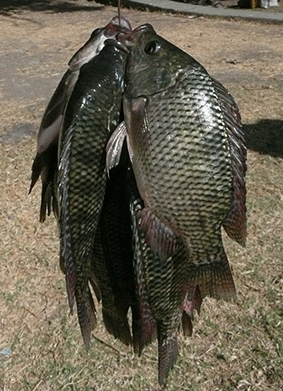5.3.5 Food
Population movements also put pressure on food supplies and on food distribution. As people migrate to the cities, they tend to use purchased food instead of their own crops and this makes them more vulnerable to changes in food prices. As the population grows and the demand for water and land increases, it becomes difficult to increase food production in a sustainable way. The increase in urban demand, combined with a loss of agricultural land, means more pressure on rural people to produce food for the growing number of urban people.
Furthermore, pollution from urban areas can disrupt food supply. For example, fisheries are often damaged by urban domestic wastes and liquid effluents from city-based industries. (Effluent is another word for wastewater that flows out from a source.) In several Ethiopian cities, such as Bahir Dar, Hawassa, Bishoftu and others, untreated wastes are dumped into nearby lakes, which can damage the fish stocks (Figure 5.9).

5.3.4 Health
